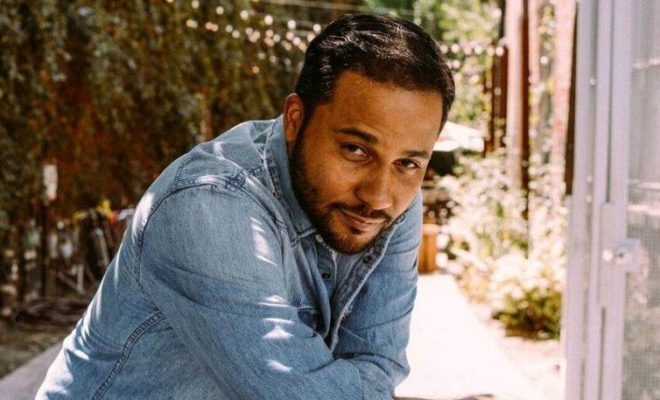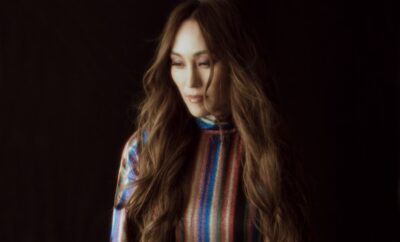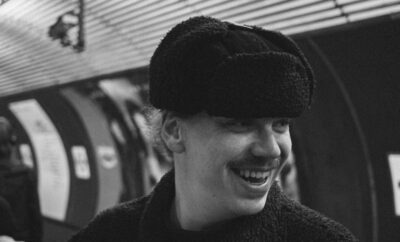
Interviews
Jason Dirden – American Soul
By: Jamie Steinberg
Q) What have been some of the recent projects that you have been working on?
A) It’s been a crazy time because of the pandemic everything is shut down. We finished filming “American Soul” at the end of November and I had some things coming up, some possibilities, that would start in May. And that kind of got shut down. [laughs] How do you social distance on set? So, I haven’t been working on anything that would pay me, but being an artist once you get past the paralysis and the depression thinking about the state of the world I had to say, “How is this effecting me in a way that I can create art that will then effect society in a positive and a progressive way?” So, I’ve been writing a lot. I’ve been observing other peoples’ art and allowing that to inspire me to move forward. So, it’s been a balance of that being an artist. I have my own personal project that I’ve been working on for a while with my brother and my father in this screenplay. We’ve had the time to workshop it. So, in that respect, this downtime has been a blessing to create this passion project.
Q) What can you tease are some themes we will be exploring this season on “American Soul?”
A) I love to think that as a whole this season is personal. The first season is a lot about business. We had to set up the business of “Soul Train” and Don and how he is going to get off the ground. Now that is set up and he’s basically on top, it gets a whole lot more personal in terms of what he had to keep it. Also, all the characters around him are just as ambitious. So, their personal lives are affected. Especially for my character, his past is coming back to haunt him and threatens everything that he’s done in every way. He’s trying to move away from his dark life – that gangster life – and that past is coming back to threaten that, to threaten his legit brand. I think the personal really allows the fireworks because the stakes are so much higher because now, you’re talking about my life. Not just my business, but my life. This season is so personal.
Q) What is in store this season for Gerald?
A) Oh man! You’ll be seeing him in a position you don’t normally see him in with him being scared, vulnerable and not having control over the situation when his past comes back to haunt him in a very personal way. He doesn’t know what to do. He doesn’t know what to do. He’s a chess player, but now he’s playing against a master chess player. [laughs] Instead of thinking two steps ahead, he’s not having to think four or five steps ahead. And in this situation, you don’t know if he’s going to make it out.
Q) How did you prep to play a role in this period piece?
A) I love period pieces because it really gives you the opportunity to learn about a time period that you were not living in. And the 70’s were an interesting time period, not just in America, but especially in America for the African American culture and what they were fighting for and how they expressed themselves. And the way we were expressing ourselves as it went beyond protests and what we were saying. It was also about what we were wearing, how we were moving and what songs we chose to sing. It wasn’t just about the party. Part of the 70’s is being sensationalized into “free love” and partying and disco. But the African American culture was still fighting for certain civil rights, to be heard and to be expressed. Researching that portion of our culture in American history and more specifically researching “Soul Train” and what that looked like and what the bands were doing and the singers were singing during that time really informed me how different of a mentality we moved through life then versus now. We moved through life then with so much more purpose and much more intention. Of course, you’ll see them with a little more funk and flair and swag and fashion and personality. Marrying those two really gave me some insight on the 70’s. It was just incredible information to know.
Q) When it comes to getting into character, does it take you putting on those 70’s threads to find Gerald?
A) It’s a combination of so many things. Of course, it’s the research you do. You write all of that down and try to get a good handle on the research. The costume, the makeup and the music all play a part into getting into character. People tell me that Gerald has this walk and I watched Season One and he absolutely has a walk that I cannot duplicate if I do not have on the costume and my slick back like my character. [smiles] It informs you so much. The clothes you are wearing and the way your hair is styled. If you have porkchop sideburns or gold teeth. Of course, the music! It puts you in a different time period. It gives you a different groove. It gives you a different rhythm. [chuckles] And it’s not 2020. All of that coming together helped make the character. Seeing the world around me, the set and everyone else in their 70’s wardrobe it’s like I’m actually there in 1975. And my body won’t let me move the way I normally would in 2020.
Q) Going into Season 2, was there someone(s) you were hoping to share a scene with?
A) I always love to be in the scenes with the guest stars. I would have loved to have been in a scene with Wayne Brady playing Little Richard. I watched it and they just had so much fun. I got a chance to do that a little bit in Season 2, but not with everybody. I just love to see, number one, who they are going to cast for like a James Brown or Sly and the Family Stone. Then, to see them actually transform into these people and be able to work with them…Because those scenes are very authentic as far as the relationship they had with Don or some of the issues that the person in the scene were actually dealing with. Those are factual issues and I would love to be a part of that storytelling. It’s always fun playing with someone who is coming into the family to play these iconic singers. And we have some incredible people coming in to play. We’ve got DC Young playing Sly and The Family Stone. Darius McCrary, who you may remember from “Family Matters” is playing James Brown. Melanie Fiona plays Chaka Khan. Big Boi from Outkast is playing George Clinton. And let me tell you, that is a sight to see! [laughs] I think we did a good job of capturing that environment of George Clinton & the P-Funk Allstars in the studio. That was a fun time.
Q) What have been some of your favorite episodes of moments from filming?
A) There are some scenes here and there. I love the writing in Season 1. There were some scenes, especially with my character. But I’ve got to say, it’s just really been incredible to be a part of this storytelling of history. When you get a chance to ride the ride of legacy and reveal information to the public that they never knew and surprise the hell out of them with factual information and still be entertaining and give you twists and turns…It’s just been such an incredible, incredible ride. My character is fictional, but he is a representative of the underworld that Don may or may not have been ready for. So, to be able to play that symbol has been so fun. Everyone knew Don Cornelius on Saturdays, but no one knew him Sunday through Friday. No one knew what it took for him to get the show off the ground. Whether it was racism, singers preferring to go to “American Bandstand” because they were actually paid or the crossover audience…They were trying to persuade African American groups saying, “Here, come over to my production because it is for us and by us.” People still opposing that persuasive argument. Again, just to be a part of something that educates and entertains is a wonderful mirror that any artist would love to be a part of. Educating the public and entertaining them at the same time – that’s a powerful combination. We have to do it with bell bottoms and afros. [laughs]
Q) Do you think it’s that incredible look into the life of Don Cornelius and “Soul Train” that makes “American Soul” such a fan favorite show?
A) Absolutely. Absolutely. Just on the surface, the 70’s fashion. So much of it is repeated. So much of it is cyclical. Every seven years you bring the bell bottoms back or you bring the afro back. People still walk around with their afro pick in their hair from time to time. That style, that swag, that funk is always brought back. So, there was always an interest in seeing that world. But then when you pair it with a legacy that ended (as far as taping – for what – fifteen years now) …It started in 1971 nationally so you’re talking almost fifty years ago that the “Soul Train” line started. When is the last family reunion or wedding that you’ve gone to that they did not have a “Soul Train” line? It’s that kind of legacy. People want to know how it started. People want to know what it took for it to be maintained. People want to know the man behind the microphone – the man behind the scramble board. They want to know all that it took and the more they find out the more moving parts they understand that it took to create what we now know is “Soul Train.” If they showed old episodes every Saturday during this stay at home order, people would be watching it every single Saturday! When you get to educate and they learn more about what it took to have this show – this legacy, this platform…I always say in every interview, the thing about “Soul Train” that was so groundbreaking before this series (at least cinematically television wise) African Americans did not have a platform where they could be themselves in front of the world. I think African Americans are only themselves in the backyards of their own homes. Walking outside of the backyard, they are aware of making everyone else comfortable or what they may appear to be or what they can say or can’t say. Walking in their backyard they can be themselves fully and unapologetically. “Soul Train,” to me, was the backyard of their home. It just happened to be televised for the whole world to watch. That was the only space during that time period where they could be that way and that’s why it’s such a great legacy. It was so groundbreaking because we saw people…The same people that we thought we knew like Marvin Gaye, James Brown, Patti LaBelle and Barry White, but if you watch them on “American Bandstand” and then you watch them on “Soul Train” they are totally different performances. They are totally different performances because now they are receiving the energy from the dancers who are actually dancing with them as they sing whereas on “American Bandstand” everyone moves out of the way and they have the performance that is very nice, very gentle and very cute. “Soul Train” was a backyard party. And then the songs they chose to sing, some of them the labels wouldn’t allow them to sing on television with “American Bandstand” because they were too politically controversial. But on “Soul Train” Don was like, “No, sing it. Our people need to hear this. If white people are watching or any other culture watching or races watching they need to hear it too because you are a reflection of what is going on in our culture and what is going on in the world. When the audience sees that part of the story, the part of the story that goes beyond entertainment; the part of the story that goes behind the “Soul Train” line and the Asian lady with the long hair…All of it is iconic and all of what makes “Soul Train” what it is, they may see, “Oh wow! This is why I stuck with it. This is why it was so important to my parents or my grandparents because of all of these other elements. Because they were different. It wasn’t just the music. It wasn’t just the rhythm. It wasn’t just the clothes. It was, “Okay, there is intention behind this that goes far beyond entertainment and selling records.” I think that part of the story that we’re able to tell really, really keeps the audience on the ride – of all generations.
Q) You are a part of social media. What kind of fan feedback have you received to Season 2?
A) Oh man! They love it! They love the Season 2 premiere because we were able to get right into it. We were able to get right into all cliffhangers. There was no more spinning of who this character is or who that character is and what is their relationship. No, we know everybody. So, now we’re jumping into the deep end.
Q) What would you like to say to the fans and supporters of you and your work?
A) Thank you. Thank you for taking the ride with us on this train. Stay on the track because it’s going to get crazy this season. It’s going to get very, very, very, very crazy this season. And funky, of course! It wouldn’t be “Soul Train” without it being funky. But thank you.





You must be logged in to post a comment Login